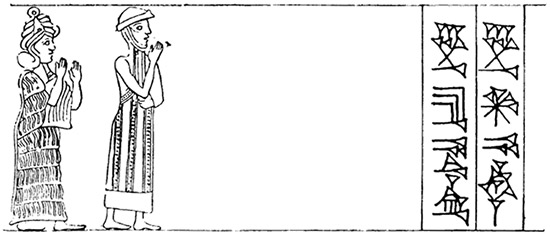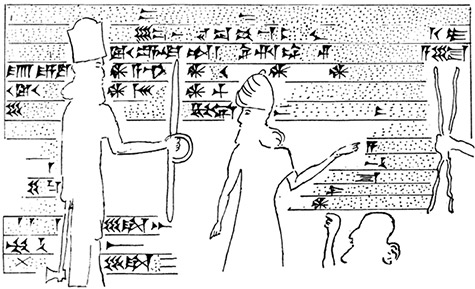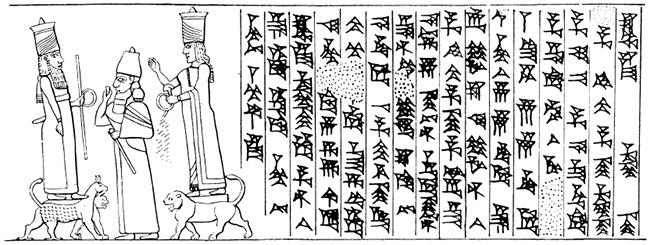 Edit article
Edit articleSeries
YHWH’s Covenant: Why Moses Calls Heaven and Earth as Witnesses

Part of a clay tablet showing the beginning of Esarhaddon’s Succession Treaty, 672 B.C.E. Three seal impressions run across the bottom half of the fragment (see reconstructions below). © The Trustees of the British Museum
In his opening speech in Moab, Moses warns the Israelites against abandoning YHWH for the worship of idols, and then declares:
דברים ד:כו הַעִידֹתִי בָכֶם הַיּוֹם אֶת הַשָּׁמַיִם וְאֶת הָאָרֶץ כִּי אָבֹד תֹּאבֵדוּן מַהֵר מֵעַל הָאָרֶץ אֲשֶׁר אַתֶּם עֹבְרִים אֶת הַיַּרְדֵּן שָׁמָּה לְרִשְׁתָּהּ לֹא תַאֲרִיכֻן יָמִים עָלֶיהָ כִּי הִשָּׁמֵד תִּשָּׁמֵדוּן.
Deut 4:26 I call heaven and earth this day to witness against you that you shall soon perish from the land that you are crossing the Jordan to possess; you shall not endure in it, but shall be utterly wiped out.
Why does Moses invoke heaven and earth as witnesses? Before offering his own solution (more on this later), R. Abraham Ibn Ezra (1089–1164) rejects that Moses is indirectly invoking divine and earthly beings:
אבן עזרא דברים ד:כו יש אומרים כי טעם עדות שמים וארץ המלאכים ובני אדם.
Ibn Ezra Deut 4:26 Some say the witness of heaven and earth refers to the angels and the human beings.
Ibn Ezra is correct: Moses does not intend to invoke living beings. His words, however, draw on ancient Near Eastern treaty traditions that do.
Gods of the Heavens and Earth in ANE Treaties
Many ancient Near Eastern treaties have been excavated: these political documents were written by powerful kings to ensure the loyalty of subject peoples.[1] Their provisions illuminate key aspects of Deuteronomy, including its demand of exclusive loyalty to YHWH (e.g., 6:4–15) and the threatened curses at its conclusion (28:15–68). In broadest terms, YHWH assumes the role usually played by the human monarch and the biblical commandments are equivalent to the treaty stipulations.[2]
Moses’s call to heaven and earth is comparable to the invocations of divine witnesses before whom these ancient treaties were solemnized. For example, in the treaty between the Hittite king Suppiluliuma I and Huqqana, leader of a territory called Hayasa (c. 1350 B.C.E.), the Hittite king states:[3]
No. 3 §6 (A i 35–40) …I have now placed these word (i.e., the terms of the treaty) under oath for you, and we have now summoned the Thousand Gods to assembly in this matter.
An impressively long list of named gods follows. The last entries on this list are:
No. 3 §8 (A i 48–59) …all the deities of Hatti, the deities […] of the land, the deities of heaven, the deities of the earth, the mountains, [the rivers, the springs, the clouds], heaven, the earth, the great sea—they [shall be witnesses].”[4]
Even closer to Deuteronomy’s language is a mid-8th century B.C.E. treaty between Bargaʾyah, king of KTK,[5] and Matiʿel, the king of Arpad, inscribed in Old Aramaic on a stele found at Sefire in Syria, which is formalized in the presence of numerous pairs of named deities as well as the heavens and the earth:
Stele I Face A ll. 6b–14a …in the presence of Heav[en and Earth in the presence of (the) A]byss and (the) Springs, and in the presence of Day and Night—all the god[s of KTK and the gods of Ar]pad (are) witnesses (to it). Open your eyes (O gods!), to gaze upon the treaty of Bargaʾyah [with Matiʿel, the king of Arpad].[6]
The treaty ends with a curse against anyone who changes or violates its terms, now or in the future:
Stele I Face C ll. 17–24 Whoever will not observe the words of the inscription which is on this stele or will say, “I shall efface some of its words,” or “I shall upset the good treaty-relations and turn (them) [to] evil,” on any day on which he will d[o] so, may the gods overturn th[at m]an and his house and all that (is) in it![7]
Permanent Witnesses
These comparisons point up the parallels between Deuteronomy and the ancient treaties, but they also highlight Deuteronomy’s particularly monotheistic flavor, in which heaven and earth are animate enough to serve as witnesses, but they are not deities themselves, and certainly do not appear as witnesses alongside any other named deities.
As Ibn Ezra notes, their participation guarantees that the promise of blessing or punishment will last beyond any human’s lifetime:
אבן עזרא דברים ד:כו והנכון בעיני להיותם עדים שיראום תמיד הם ובניהם כי הם עומדים כטעם כימי השמים על הארץ [דברים יא:כא] וכן שמעו הרים את ריב ה' [מיכה ו:ב]. וכן האבן הזאת תהיה בנו לעדה [יהושׁע כד:כז].
Ibn Ezra Deut 4:26 However, it appears to me that heaven and earth are witnesses, and the Israelites and their children will always see them, for they are everlasting, as in “as the days of the heavens above the earth” (Deut 11:21). “Hear, O ye mountains, the Lord’s controversy” (Mic 6:2); and “Behold, this stone shall be a witness against us” (Josh 24:27) are similar.[8]
The Gods Sign Esarhaddon’s Succession Treaty
The extensive 672 B.C.E. succession treaty of king Esarhaddon,[9] which sought to ensure that his son, Assurbanipal, would succeed him as ruler, follows a similar pattern. After the preamble, which identifies Esarhaddon and Assurbanipal, the treaty presents a list of astral entities (five planets and the star known as Sirius today) and named deities before whom the treaty was completed. A summary invocation of the gods dwelling in heaven and earth follows this list:
SAA02 006 ll. 11–24 …(which he) confirmed, made and concluded in the presence of Jupiter, Venus, Saturn, Mercury, Mars and Sirius; in the presence of Assur, Anu, Ill[il], Ea, Sin, Samas, Adad, Marduk, Nabu, Nusku, Uras, Nergal, Mullissu, Serna, Belet-ili, Ištar of Nineveh, Ištar of Arbela, the gods dwelling in heaven and earth, the gods of Assyria, the gods of Sumer and [Akka]d, all the gods of the lands.[10]
The tablet also presents the deities as having “signed on the dotted line”—as witnesses do today and might have done even then—with three seal impressions, produced by rolling cylinder seals across the clay. The document’s first written words are:
SAA02 006 ll. i–iv Seal of the god Aššur, king of the gods, lord of the lands, not to be altered; seal of the great ruler, father of the gods, not to be disputed.
The three seal impressions have been placed between the preamble and the list of divine witnesses. Each impression combines a pictorial image with a textual legend, or caption, that names its divine owner, and each has a history that predates the treaty:[11]
An ancient Assur seal – Dating to the 19th century B.C.E., and thus over 1000 years old at the time of the treaty, this seal would have been kept in the “city hall” of the ancient Assyrian capital city, Assur. The legend reads:
Belonging to (the god) Assur; that of the City Hall.
The impression sits between the other two seals on the tablet and is perpendicular to them, which visually underscores its centrality.

Likely Assur and Ninurta’s seal – Dated on art-historical grounds to the Middle Assyrian period (1400–1200 B.C.E.), the seal’s legend is broken, but it mentions the gods Assur and Ninurta, who are depicted in the seal’s image with the king kneeling between them.

Assur’s seal – Signed by Sennacherib, Esarhaddon’s father (r. 705–681 B.C.E.), who stands between the gods Assur and Mullissu in the image. On the right, the legend begins by declaring that the seal belongs to Assur:
The Seal of Destinies, with which Assur, king of the gods, seals the destinies of the Igigi and Anunnaki of heaven and earth, and of mankind. What he seals with it, he does not alter.

The presence of Assur’s seal on the treaty is evidence of the god’s role as a witness. In that capacity, as the legend makes clear, Assur guarantees that the treaty will survive, unchanged, even after Esarhaddon’s death.[12] The legend also identifies Assur as the agent of punishment against someone who would dare to change the contents of the document:
He who should alter (it), may Assur, king of the gods, and Mullissu,[13] together with their children kill him with their mighty weapons. I am Sennacherib, king of Assyria, a prince who fears you. Whoever erases my name and discards this Seal of Destinies of yours, erase his name and seed from the land!
Like Assur, who is listed first among the deities who will “decree an evil fate” for any transgressor,[14] the heavens and earth are also the first witnesses to implement divine judgement in Deuteronomy.
The Witnesses Implement Blessings and Curses
At the end of his speeches, Moses urges the nation to “choose life”:
דברים ל:יט הַעִידֹתִי בָכֶם הַיּוֹם אֶת הַשָּׁמַיִם וְאֶת הָאָרֶץ הַחַיִּים וְהַמָּוֶת נָתַתִּי לְפָנֶיךָ הַבְּרָכָה וְהַקְּלָלָה וּבָחַרְתָּ בַּחַיִּים לְמַעַן תִּחְיֶה אַתָּה וְזַרְעֶךָ.
Deut 30:19 I call heaven and earth to witness against you this day: I have put before you life and death, blessing and curse. Choose life—if you and your offspring would live.
Referring to the law of stoning the idolater, R. Yosef Bechor Shor (12th cent.) teases out the function of heaven and earth as witnesses by arguing that like the human witnesses, heaven and earth’s “hands” shall be first against Israel:
בכור שור דברים ל:יט יש לפרש: פמליא של מעלה ופמלייא של מטה. ועיקר הפשט: השמים והארץ הם יעידו עליכם, וידם תהיה בכם בראשונה הן לטוב הן לחילוף, כדכתיב יד העדים תהיה בו בראשונה [דברים יז:ז].
Bechor Shor Deut 30:19 It can be interpreted to mean an entourage from above and an entourage from below. But the simple meaning is: The heavens and the earth will testify about you, and their hand will be against you first, both for good or for its opposite, as it is written, “Let the hands of the witnesses be the first against him” (Deut 17:7).
Bechor Shor continues, drawing a connection to verses in which agricultural blessings and curses come through heaven and earth:
בכור שור דברים ל:יט אם תעשו טובה יעידו: "ונתנה הארץ פריה" [ויקרא כה:יט], "והשמים יתנו טלם" [זכריה ח:יב], וגשמיהם בעתם, ואם רע "ועצר את השמים ולא יהיה מטר, והאדמה לא תתן את יבולה" [דברים יא:יז], אפילו מה שמובילין לה [ספרי דברים מג].
Bechor Shor Deut 30:19 If you do good, they will testify: “And the earth gave her fruit” (Lev 25:19), and “the heavens will give their dew” (Zech 8:12), and their rains in their season (cf. Lev 26:4); and if bad, “the heavens will be closed up and there will be no rain, and the earth will not give its crops” (Deut 11:17)—even what they try to plant in it (cf. Sifrei Deuteronomy 43).[15]
YHWH Rules the Enforcers
Moses calls on heaven and earth as witnesses for comparable reasons. He demonstrates that God’s treaty with the nation is permanently binding. Ever-present heaven and earth guarantee that it will last well beyond the day of its promulgation, and that it will apply to all future generations. And, because the blessings and curses pertain directly to heaven and earth, there can be no better witnesses to stand behind the promised future outcomes.
These parallel purposes apply only within Deuteronomy’s theological limits, however. Like the other Near Eastern kings, YHWH forges a treaty with the vassal nation, Israel. Unlike these human kings, however, YHWH is not subject to the witnesses; indeed, it is Moses, rather than YHWH, who invokes heaven and earth.
Comparison with the Near Eastern treaties can explain Moses’s invocation as a rhetorical device that imagines the heavens and earth as independent enforcers of the treaty’s terms. The treaty itself, however, says otherwise. It is YHWH, and YHWH alone, who can command or prohibit blessings of heaven and earth.
TheTorah.com is a 501(c)(3) nonprofit organization.
We rely on the support of readers like you. Please support us.
Published
September 20, 2024
|
Last Updated
March 21, 2025
Previous in the Series
Next in the Series
Before you continue...
Thank you to all our readers who offered their year-end support.
Please help TheTorah.com get off to a strong start in 2025.
Footnotes

Prof. Shalom E. Holtz is professor of Bible at Yeshiva University. He did his Ph.D. at the University of Pennsylvania. He is the author of Neo-Babylonian Court Procedure (Cuneiform Monographs 38; Leiden: Brill, 2009) and Neo-Babylonian Trial Records (Society of Biblical Literature, 2014) and Praying Legally (Brown Judaic Studies, 2019).
Essays on Related Topics:









